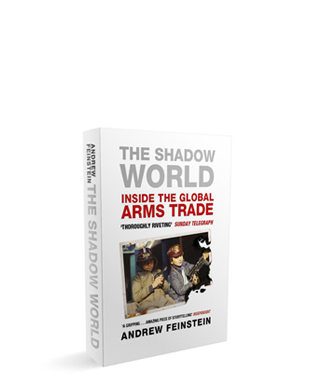
The National Priorities Project "Costs of National Security" website helps paint that picture. But numbers are cold facts that like the winter winds numb us.

Ernie Regehr in a new book Disarming Conflict (2015, Zed Books) takes us through what armed conflict has bought us as a human family since the end of the Cold War.

Most of the wars over the past few decades have been civil wars or intrastate wars. Millions have died. Destruction of mind-boggling proportions have accrued, Refugees and internal displaced persons are at record highs. And yet we prepare for more of it. Regehr sifts through the data about what has been won. The answer is rarely anything. And yet we persist.
Chris Hedges in his first hand account of wars he covered as a war correspondent for the New York Times in his award winning yet distressing War Is a Force That Gives Us Meaning lays it as bare as words without pictures possibly could.
Peter Van Buren's We Meant Well: How I Helped Lose the Battle for the Hearts and Minds of the Iraqi People depicts the horrid waste and madness of trying to rebuild what we just destroyed while expecting it to be better than ever.

Andrew Feinstein' Shadow World: Inside the Global Arms Trade will open one's eyes to the skulduggery, corruption, and power of the world's arms merchants and why the intractability of the flow of arms is making powerful players wealthier and more powerful.

While we urgently fight the rise of gun violence in our cities, we have yet to make the connection with our own national proclivity to violence. Bernie Sanders made an insightful statement during the debate this past week about capital punishment when asked if he supported it.
"Of course there are barbaric acts out there, but in a world of so much violence and killing, I just don't believe that government itself should be part of the killing."
If we extend that logic to all the ways governments enable killing beyond capital punishment we might reduce the scourge of war and murder. As Regehr points out wars don't start without access to arms.In fact the research shows that there are four chief ingredients to start wars.
1) The presence of heightened political, economic, and social grievances;
2) Intergroup competition and conflict that reflects disunity within a society;
3) Capacity for sustained use of force;
4) The perceived lack of alternatives to settle grievances through nonviolent conflict resolution.
The gun lust that hearkens us all to own and brandish weapons is a key feeder of war. Not only are we a gun-happy culture, but as the largest by producer and seller of arms, we have exported the concept and thus have helped sow more wars.

To read
Regehr, Hedges, Van Buren and Feinstein that becomes all the more apparent. As
Regehr poignantly notes:
In conflicts between states or blocs of states, the greater the armaments and armaments competition, the more the focus shifts away from the political and economic substance of the conflicts to concentrate instead on the competitive accumulation of arms and fighting forces and the political distortions that accompany them. It is a process of dynamic militarization that both relies on and generates a climate of intense suspicion, distrust, hostility, and confrontation, all of which are deeply inimical to rational attention while the political conflicts that visit an interactive world. The arms race itself becomes a primary point of contention while the political issues at stake are lost first to the drum beat and then the fog of war...
... the capacity to wage conflict by military means, between and within states, continues to enjoy disproportionate attention and funding. Political and business acumen has been employed to the fullest to exploit lack of controls and the pervasive secrecy that characterizes the arms industry in order to promote universal access to the tools of war - arms and ammunition - along with maximum profit. President Eisenhower's famous warming about the military-industrial-complex is certainly no less salient today than it was when he raised it in his January 1961 farewell address. It continues to drive an insatiable appetite for military aggrandizement that can never admit to reaching a point of sufficiency. The perceived threat seems always to exceed the accumulated military might to counter it. And so, a relentless culture of vulnerability is promoted by the military-industrial-congressional-scientific-think tank complex (one could keep adding to the list of the component elements). It seeks to keep military funding on track and helps to shape the political culture and national psyche.(p.134-5)
Perhaps our poets and songwriters can put this in a perspective that journalists, scholars, and activists can't quite convey of this scourge and its causes. John Gorka's song War Makes War is perhaps a most succinct summary. But the song that inspired the title of this post, made popular by Edwin Starr in 1969, is equally poignant.
War
War, huh yeah
What is it good for?
Absolutely nothing, oh hoh, oh
War huh yeah
What is it good for?
Absolutely nothing, say it again y'all
War, huh good God
What is it good for?
Absolutely nothing, listen to me
What is it good for?
Absolutely nothing, oh hoh, oh
War huh yeah
What is it good for?
Absolutely nothing, say it again y'all
War, huh good God
What is it good for?
Absolutely nothing, listen to me
Oh, war, I despise
'Cause it means destruction of innocent lives
War means tears to thousands of mothers eyes
When their sons go off to fight and lose their lives
'Cause it means destruction of innocent lives
War means tears to thousands of mothers eyes
When their sons go off to fight and lose their lives
I said
War, huh good God y'all
What is it good for?
Absolutely nothing, just say it again
War whoa Lord
What is it good for?
Absolutely nothing, listen to me
War, huh good God y'all
What is it good for?
Absolutely nothing, just say it again
War whoa Lord
What is it good for?
Absolutely nothing, listen to me
War, it ain't nothin' but a heartbreak
War, friend only to the undertaker
Oh war, is an enemy to all mankind
The thought of war blows my mind
War has caused unrest within the younger generation
Induction, then destruction who wants to die
The thought of war blows my mind
War has caused unrest within the younger generation
Induction, then destruction who wants to die
War, good God, y'all
What is it good for?
Absolutely nothing, say it, say it, say it
War, uh huh, yeah, huh
What is it good for?
Absolutely nothing, listen to me
What is it good for?
Absolutely nothing, say it, say it, say it
War, uh huh, yeah, huh
What is it good for?
Absolutely nothing, listen to me
War, it ain't nothin' but a heartbreaker
War, it's got one friend that's the undertaker
Oh, war has shattered many young man's dreams
Made him disabled bitter and mean
Life is much too short and precious to spend fighting wars these days
War can't give life it can only take it away, ooh
Made him disabled bitter and mean
Life is much too short and precious to spend fighting wars these days
War can't give life it can only take it away, ooh
War, huh, good God y'all
What is it good for?
Absolutely nothing, say it again
War, whoa, Lord
What is it good for?
Absolutely nothing, listen to me
What is it good for?
Absolutely nothing, say it again
War, whoa, Lord
What is it good for?
Absolutely nothing, listen to me
War, it ain't nothin' but a heartbreaker
War, friend only to the undertaker
Peace love and understanding tell me
Is there no place for them today
They say we must fight to keep our freedom
But Lord knows there's got to be a better way
Is there no place for them today
They say we must fight to keep our freedom
But Lord knows there's got to be a better way
War, huh, good God y'all
What is it good for?
You tell 'em, say it, say it, say it, say it
War, good Lord, huh
What is it good for?
Stand up and shout it, nothing
War, it ain't nothin' but a heartbreaker
What is it good for?
You tell 'em, say it, say it, say it, say it
War, good Lord, huh
What is it good for?
Stand up and shout it, nothing
War, it ain't nothin' but a heartbreaker
Songwriters
Strong, Barrett / Whitfield, Norman J.
Strong, Barrett / Whitfield, Norman J.
Published by
Lyrics © Sony/ATV Music Publishing LLC
Lyrics © Sony/ATV Music Publishing LLC

No comments:
Post a Comment